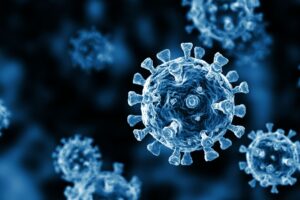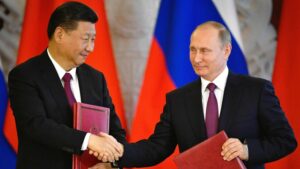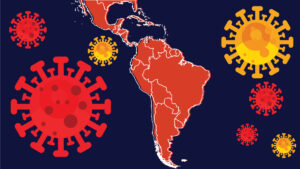
Overview
COVID-19 has had a massive impact on Latin American countries, mainly because of lack of infrastructure and funding for medical products and vaccines. China and the United States emerged as the global leaders for vaccines, as they collectively combined for over half of the global production. The other main vaccine producers are Russia and European countries, such as the United Kingdom and Sweden. Vaccine nationalism is a term that came into existence in the past few years as a way to describe the rivalry over immunization dominance in Latin America.
United States
The United States geopolitical strategy for COVID-19 in Latin America was founded on security and overall health safety. The U.S. wanted to distribute vaccines throughout its backyard to be able to offset the rise of Russian and Chinese vaccines. The coalition of the United States and European countries worked together because they saw Russia and China as major threats to the security of Latin America. The U.S. policy can be considered a reaction to the strategic moves of Russia and China, and the U.S. saw a need to reinforce political and security dominance in the region through vaccine geopolitics. Immigration factors into the COVID-19 discussion because without immunization, many Latin American people, especially Mexican populations close to the U.S. border, will try to get to the U.S. for medical care. By bolstering the supply of vaccines in Latin America, the U.S. was not only fighting off global rivals but also protecting national security.
In terms of the actual statistics on the United States’ impact on COVID-19 in Latin America, The Biden Administration distributed 67.2 million immunization doses, as of March 2022, to the Western Hemisphere with the help of COVAX (COVID-19 Vaccines Global Access). This substantial allocation helped improve the lives of Latin Americans, as well as keep the United States from losing influence against global opponents.
China
In addition to dominating vaccine production alongside the United States, China now leads the world in exportation of vaccines. The Chinese Belt and Road Initiative has been crucial in striving for dominant influence in Latin America. In 2017, the Chinese brought their Belt and Road Initiative to Latin America by establishing it in Panama. Only years before the outbreak of COVID-19, the infrastructure in place was decisive to China getting a head-start in aiding Panama and other Latin American countries nearby. Their Belt and Road Initiative was mainly bolstered through issuance of vaccines.

President Xi Jinping of China and President Vladimir Putin of Russia
Russia
Similarly to China, Russia has strong motives when establishing themselves in the Latin American geopolitical scene concerning vaccines. By developing relationships with Latin American countries, Russia was able to raise their global exportation standards. However, they are still considered below global leaders like China. This is a reason why the good relations between Russia and China have been successful for the Russians.
Europe
Unlike the many of the other global powers mentioned above, European countries mainly from the European Union are less focused on global exportation than they are on internal distribution of COVID-19 vaccines. However, AstraZeneca based out of the United Kingdom and Sweden, one of the leading pharmaceutical firms for vaccine production, have contributed to a slight uptick in European exportation due to their global role.

Recent Comments